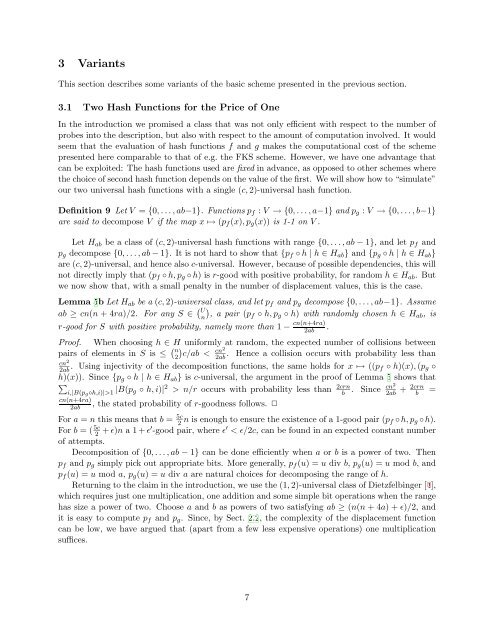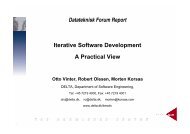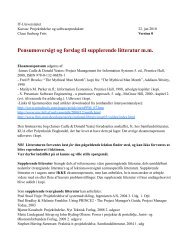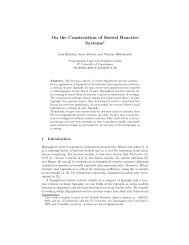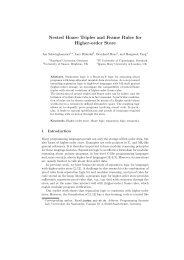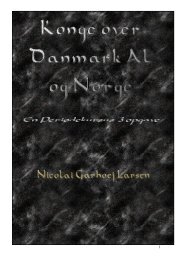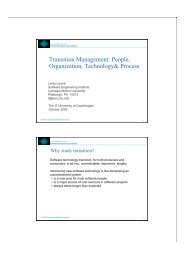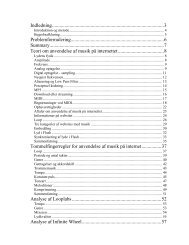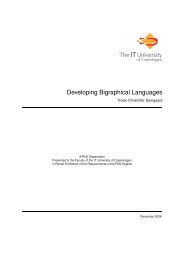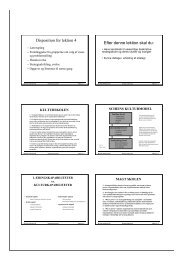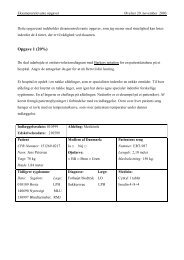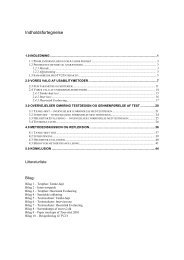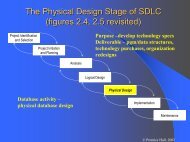Efficient Evaluation of Minimal Perfect Hash Functions
Efficient Evaluation of Minimal Perfect Hash Functions
Efficient Evaluation of Minimal Perfect Hash Functions
You also want an ePaper? Increase the reach of your titles
YUMPU automatically turns print PDFs into web optimized ePapers that Google loves.
3 VariantsThis section describes some variants <strong>of</strong> the basic scheme presented in the previous section.3.1 Two <strong>Hash</strong> <strong>Functions</strong> for the Price <strong>of</strong> OneIn the introduction we promised a class that was not only efficient with respect to the number <strong>of</strong>probes into the description, but also with respect to the amount <strong>of</strong> computation involved. It wouldseem that the evaluation <strong>of</strong> hash functions f and g makes the computational cost <strong>of</strong> the schemepresented here comparable to that <strong>of</strong> e.g. the FKS scheme. However, we have one advantage thatcan be exploited: The hash functions used are fixed in advance, as opposed to other schemes wherethe choice <strong>of</strong> second hash function depends on the value <strong>of</strong> the first. We will show how to “simulate”our two universal hash functions with a single (c, 2)-universal hash function.Definition 9 Let V = {0, . . . , ab−1}. <strong>Functions</strong> p f : V → {0, . . . , a−1} and p g : V → {0, . . . , b−1}are said to decompose V if the map x ↦→ (p f (x), p g (x)) is 1-1 on V .Let H ab be a class <strong>of</strong> (c, 2)-universal hash functions with range {0, . . . , ab − 1}, and let p f andp g decompose {0, . . . , ab − 1}. It is not hard to show that {p f ◦ h | h ∈ H ab } and {p g ◦ h | h ∈ H ab }are (c, 2)-universal, and hence also c-universal. However, because <strong>of</strong> possible dependencies, this willnot directly imply that (p f ◦ h, p g ◦ h) is r-good with positive probability, for random h ∈ H ab . Butwe now show that, with a small penalty in the number <strong>of</strong> displacement values, this is the case.Lemma 5b Let H ab be a (c, 2)-universal class, and let p f and p g decompose {0, . . . , ab−1}. Assumeab ≥ cn(n + 4ra)/2. For any S ∈ ( Un), a pair (pf ◦ h, p g ◦ h) with randomly chosen h ∈ H ab , isr-good for S with positive probability, namely more than 1 − cn(n+4ra)2ab.Pro<strong>of</strong>. When choosing h ∈ H uniformly at random, the expected number <strong>of</strong> collisions betweenpairs <strong>of</strong> elements in S is ≤ ( )n2 c/ab 1 g ◦ h, i)| 2 > n/r occurs with probability less than 2crnb. Since cn22ab + 2crnb=cn(n+4ra)2ab, the stated probability <strong>of</strong> r-goodness follows. ✷For a = n this means that b = 5c2 n is enough to ensure the existence <strong>of</strong> a 1-good pair (p f ◦ h, p g ◦ h).For b = ( 5c2 + ɛ)n a 1 + ɛ′ -good pair, where ɛ ′ < ɛ/2c, can be found in an expected constant number<strong>of</strong> attempts.Decomposition <strong>of</strong> {0, . . . , ab − 1} can be done efficiently when a or b is a power <strong>of</strong> two. Thenp f and p g simply pick out appropriate bits. More generally, p f (u) = u div b, p g (u) = u mod b, andp f (u) = u mod a, p g (u) = u div a are natural choices for decomposing the range <strong>of</strong> h.Returning to the claim in the introduction, we use the (1, 2)-universal class <strong>of</strong> Dietzfelbinger [4],which requires just one multiplication, one addition and some simple bit operations when the rangehas size a power <strong>of</strong> two. Choose a and b as powers <strong>of</strong> two satisfying ab ≥ (n(n + 4a) + ɛ)/2, andit is easy to compute p f and p g . Since, by Sect. 2.2, the complexity <strong>of</strong> the displacement functioncan be low, we have argued that (apart from a few less expensive operations) one multiplicationsuffices.7


